Glasgow’s remarkable history is a tale of transformation and resilience. From its humble 6th-century origins to its 19th-century industrial zenith, the city has evolved into a vibrant cultural hub. Architectural gems like the City Chambers and the Britannia Panopticon reflect its dynamic past, while the contributions of merchants and workers have shaped Glasgow’s identity as a significant trading center. What secrets lurk beneath the city’s streets, waiting to be uncovered?
- Key Points
- Exploring Glasgow’s Storied Past
- Architectural Gems of the Second City
- The Britannia Panopticon: A Musical Legacy
- Ramshorn Church: a Glimpse Into the Past
- Merchants, Traders, and Workers: Shaping Glasgow’s Rise
- Colorful Characters and Scandalous Secrets
- Glasgow’s Transformation Through the Ages
- Navigating the Changeable Weather of Glasgow
- Frequently Asked Questions
- What Is the Cancellation Policy for the Walking Tour?
- Can Children Under 10 Years Old Join the Tour?
- Is the Tour Guide Able to Accommodate Different Languages?
- Are There Any Discounts Available for Seniors or Students?
- How Many People Typically Participate in Each Walking Tour?
- The Sum Up
- More Walking Tours in Glasgow
- More Tours in Glasgow
- More Tour Reviews in Glasgow
- Still browsing? Here are more Glasgow experiences we've covered recently
Key Points
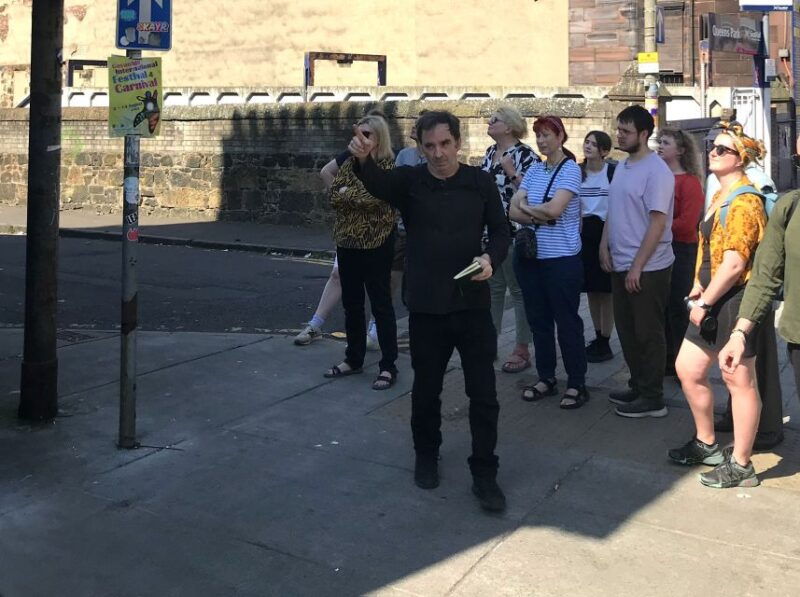
- Glasgow’s origins date back to the 6th century, and the city flourished in the 19th century as the "Second City of the Empire."
- Architectural styles in Glasgow, including Georgian, Victorian, and Edwardian, reflect the city’s evolution from medieval burgh to industrial powerhouse.
- The Britannia Panopticon, the world’s oldest surviving music hall, serves as a reminder of Glasgow’s vibrant cultural past and preservation efforts.
- Ramshorn Church, one of Glasgow’s most historic landmarks, showcases the city’s architectural heritage and Gothic-inspired design.
- Merchants and workers played a crucial role in transforming Glasgow from a medieval burgh into a major commercial and industrial hub.
Exploring Glasgow’s Storied Past
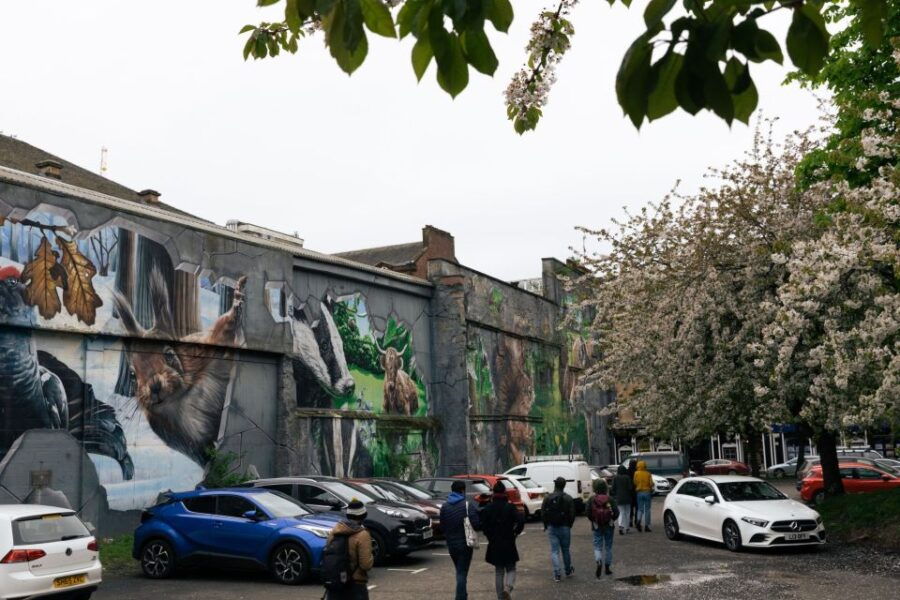
Although Glasgow’s origins date back to the 6th century, the city truly flourished in the 19th century as the "Second City of the Empire."
Visitors on this guided walking tour explore Glasgow’s storied past, from its humble beginnings as a small settlement to its transformation into a thriving industrial powerhouse.
Along the way, they’ll see landmarks like the City Chambers and the world’s oldest surviving music hall, the Britannia Panopticon.
The tour highlights Glasgow’s architectural evolution, showcasing the city’s iconic Georgian, Victorian, and Edwardian styles that cement its reputation as the most Victorian city in the UK.
Fascinated by the past? Here are other historical experiences we've covered in Glasgow
Architectural Gems of the Second City
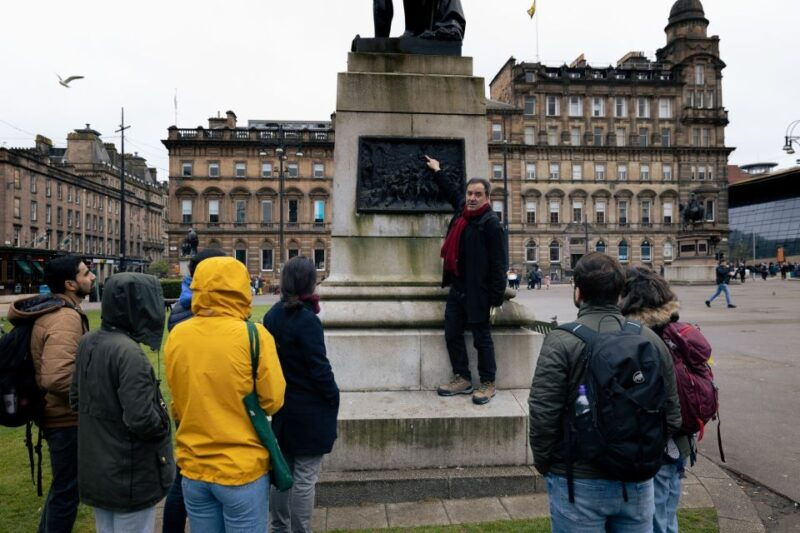
Glasgow’s iconic architectural styles are the centerpiece of the city’s transformation. From towering Georgian buildings to ornate Victorian structures, the city’s skyline reflects its history as the "Second City of the Empire." Notable architectural gems include:
| Style | Key Features | Notable Examples |
| — | — | — |
| Georgian | Symmetry, columns, red sandstone | City Chambers, Mitchell Library |
| Victorian | Ornate, grand, lavish | Kelvingrove Art Gallery, Terminus Station |
| Edwardian | Elegant, classical, stone | Ramshorn Church, Royal Exchange Square |
These architectural marvels showcase Glasgow’s evolution from a medieval burgh to an industrial powerhouse, each building a testament to the city’s resilience and reinvention.
The Britannia Panopticon: A Musical Legacy
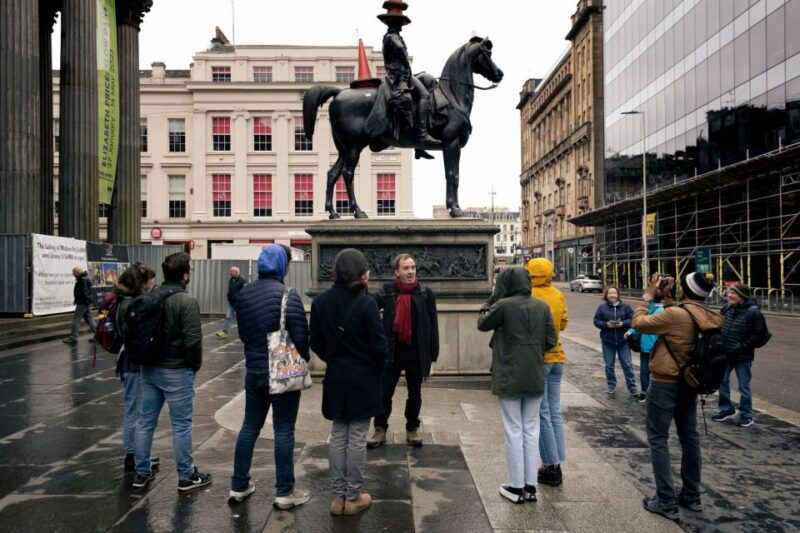
The Britannia Panopticon stands as a testament to Glasgow’s rich musical heritage.
Once the world’s oldest surviving music hall, it played host to a cavalcade of celebrated entertainers throughout the 19th century. From comedy acts to Shakespearean performances, the Panopticon’s stage witnessed it all.
Today, the building’s ornate interiors and historic charm captivate visitors, offering a glimpse into Glasgow’s vibrant past.
Though the Panopticon’s glory days have long since passed, its legacy endures, serving as a reminder of the city’s enduring cultural spirit and the power of preserving cherished landmarks.
Ramshorn Church: a Glimpse Into the Past
As one of Glasgow’s most historic landmarks, Ramshorn Church offers visitors a captivating glimpse into the city’s past.
Originally built in the 15th century, this striking stone structure has withstood centuries of change, serving as a testament to Glasgow’s rich architectural heritage.
From its Gothic-inspired design to its intricate stained-glass windows, the church exudes an air of timeless elegance.
Ramshorn Church’s Gothic-inspired design and intricate stained-glass windows evoke a timeless elegance and grandeur.
Stepping inside, visitors can almost feel the weight of history, as the walls seem to whisper the stories of the countless individuals who’ve passed through its doors over the generations.
More Great Tours NearbyMerchants, Traders, and Workers: Shaping Glasgow’s Rise
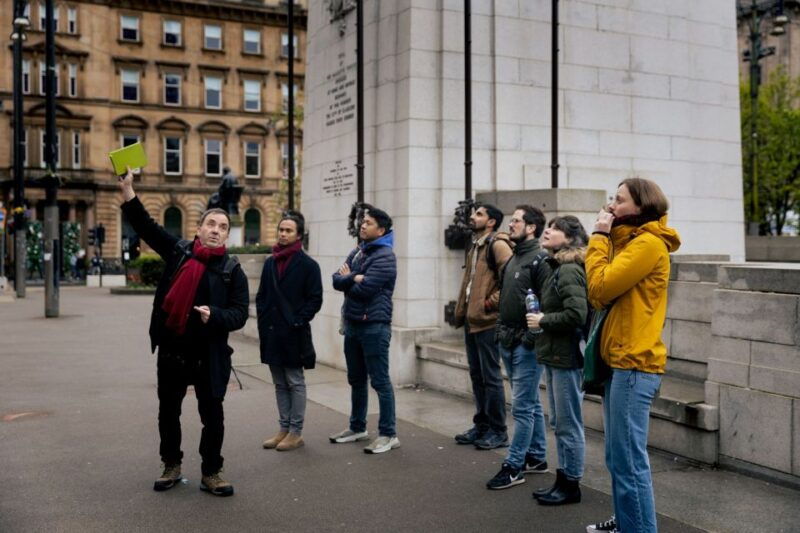
Integral to Glasgow’s remarkable transformation from a small medieval burgh to a bustling commercial hub were the merchants, traders, and workers who helped drive the city’s economic and social progress.
Key contributions of this class included:
-
Establishing Glasgow as a major trading port, facilitating the import and export of goods, and driving maritime commerce.
-
Investing in infrastructure, such as mills, factories, and warehouses, that fueled the city’s industrialization and growth.
-
Organizing trade unions and advocating for workers’ rights, shaping labor movements and social reforms that improved living and working conditions.
These individuals were the unsung heroes behind Glasgow’s rise to prominence as the "Second City of the Empire".
- Glasgow: Loch Ness, Glencoe, and the Highlands Day Tour
- Glasgow City Centre Daily Walking Tour: 10:30am, 2pm & 5pm
- Celtic Park Tour & Dine Package
- Guided Celtic Park Stadium Tour
- Loch Ness & the Highlands Day Tour From Glasgow Including Cruise
- Oban, Glencoe, Highlands Lochs & Castles Small Group Day Tour From Glasgow
Colorful Characters and Scandalous Secrets

Beneath Glasgow’s respectable façade, the city has long harbored a vibrant tapestry of colorful characters and scandalous secrets.
Beneath Glasgow’s respectable façade, the city has long harbored a vibrant tapestry of colorful characters and scandalous secrets.
From the notorious "Glasgow Vampire" who terrorized the city in the 1950s to the mysterious "Molly Malone" who was rumored to be a brothel madam, Glasgow’s history is peppered with larger-than-life personalities.
Salacious stories of gambling dens, opium rings, and illicit affairs further add to the city’s allure.
Amidst the grandeur of its Victorian architecture, Glasgow conceals a rich underworld of intrigue, debauchery, and the unpredictable nature of human nature.
Glasgow’s Transformation Through the Ages
Glasgow’s transformation over the centuries has been nothing short of remarkable. From its 6th-century origins to its 19th-century prosperity as The Second City of the Empire, the city has undergone remarkable changes.
Glasgow’s rise can be attributed to:
-
The contributions of enterprising merchants, traders, and workers who fueled the city’s industrial and commercial growth.
-
The architectural evolution, showcasing Georgian, Victorian, and Edwardian styles that earned Glasgow the title of the most Victorian city in the UK.
-
The city’s colorful characters and scandalous secrets that have shaped its rich history and captivated visitors.
Navigating the Changeable Weather of Glasgow
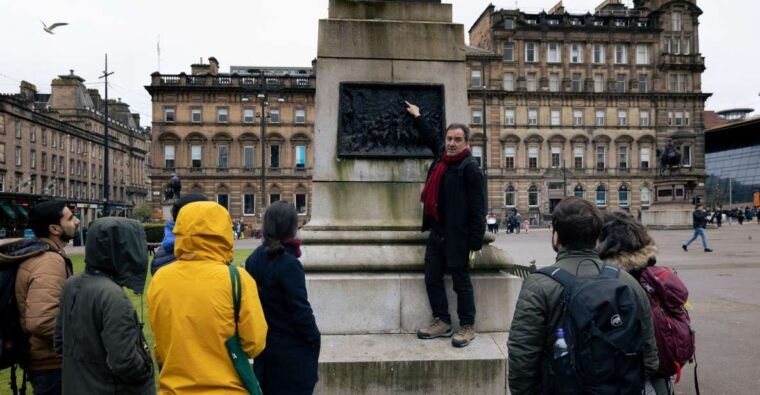
Although Glasgow’s weather can be unpredictable, with the right preparation, visitors can easily navigate the city’s changeable conditions.
Sudden showers and blustery winds are common, but packing a lightweight rain jacket and wearing comfortable, weatherproof shoes allows travelers to explore the city with confidence.
The tour guides are well-versed in managing the variable climate, offering advice on the best ways to stay dry and comfortable throughout the 2.5-hour walking tour.
With a flexible attitude and a bit of foresight, travelers can fully enjoy Glasgow’s rich history, undeterred by the region’s famously fickle weather.
Frequently Asked Questions
What Is the Cancellation Policy for the Walking Tour?
The walking tour offers free cancellation up to 24 hours in advance for a full refund. Customers can reserve the tour now and pay later, providing flexibility in their travel plans.
Can Children Under 10 Years Old Join the Tour?
The tour isn’t suitable for children under 10 years old. It requires a moderate fitness level, so younger kids may struggle to keep up with the 2.5-hour walking pace. The tour operator recommends it for adults and children over 10 only.
Is the Tour Guide Able to Accommodate Different Languages?
The tour guide speaks English and can accommodate different languages upon request. Group sizes are limited, allowing the guide to provide personalized attention to all participants.
Are There Any Discounts Available for Seniors or Students?
The tour doesn’t explicitly mention any discounts for seniors or students. However, visitors should inquire with the tour operator about potential discounted pricing options when booking the tour.
How Many People Typically Participate in Each Walking Tour?
The tours typically have 10-20 participants. The guide adapts the experience to the group size, ensuring an engaging and informative walk through Glasgow’s rich history for all attendees.
The Sum Up
Glasgow’s storied past reflects its resilience and reinvention. From its architectural gems to its cultural landmarks, the city’s vibrant history is woven into the lives of its merchants, traders, and workers. As Glasgow continues to evolve, its ability to adapt and thrive in the face of change remains a testament to the enduring spirit that has defined this remarkable city.
You can check availability for your dates here:More Walking Tours in Glasgow
More Tours in Glasgow
More Tour Reviews in Glasgow
Still browsing? Here are more Glasgow experiences we've covered recently
- We Rank The 14 Best Tours In Glasgow
- 6 Must-Try Bike Tours In Glasgow
- Discover 8 Great Walking Tours In Glasgow
- Discover 13 Great Tours & Experiences In Glasgow
- Our Picks For The 3 Best Private Driver Services In Glasgow
- Which Glasgow Food Tours To Choose? Our Best 4 Picks
- 10 Best City Tours In Glasgow
- Jackton Distillery: Tour & Tasting
- Glasgow Necropolis: Small Group Tour with Local Guide
- Glasgow: Glasgow: Group Tour on Ebike and Local Distillery!
- From Glasgow; Loch Lomond and Highlands Low-Season Tour
- Glasgow: Walk The streets with a professional actor as guide
